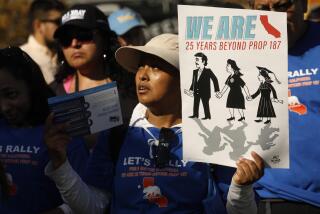Will We Still Embrace Immigrants Rushing to Citizenship?
SAN FRANCISCO — Who wants immigrants anymore? Who, frankly, needs them when there isn’t enough America to go around? Maybe 50 years ago, maybe 100 years ago . . .
More and more, I hear Americans blaspheme against the perennial American platitude. If ours was a nation of immigrants, many now wonder if we need to be a nation of immigrants in the future.
Immigrants annoy us most when they are poor. Forget brown or garlic breath or that they don’t know how to drive on the freeway. The trouble with most immigrants is that they come to this country flat broke, take and take and take.
Our politicians have apparently caught the public mood. The new federal welfare law, passed by a Republican-controlled Congress and signed by a Democratic president, severely limits government aid to immigrants who are legally here but not yet citizens. And last week, Gov. Pete Wilson signed an executive order to deny certain benefits to illegal immigrants, among them prenatal care, to implement the new law.
No one complains, of course, except for immigrant advocacy groups and some church types. Clearly, the public imagination is otherwise engaged.
At both the Democratic and Republican conventions, there was, for example, not much mention of “the great world”--that romantic phrase of the Victorians. The politicians and their relentlessly smiling spouses had very little to say about Bosnia or Africa or the state of capitalism in Shanghai.
It was as though America did not exist in the world anymore. Discussion centered, instead, on a single little noun: family. It became a mantra. Delegates in Chicago and San Diego are in favor of family. After all, “It takes a family . . . .”
The smart guys at NBC Sports learned earlier this summer that they could get very high ratings if they reconstructed the Olympics and got suburban housewives to watch. Instead of an international sporting event, NBC reduced the Olympics to a competition of anorexic teenage girl gymnasts.
Our political conventions were similarly directed at the suburban mom. The discussion was all about V-chips and teenage smoking. Hillary Rodham Clinton worried about “soccer moms.” Bob Dole invoked “family values.”
After all the speeches, the disagreement between the Democratic and Republican parties comes down to this: One candidate invokes America’s past, the other speaks of the future. Neither politician, however, conveys a heroic sense of the country, because neither man argues for the central role of immigrants in our national life, past or future.
I had the misfortune of following this week’s proceedings in Chicago while I was, at other times, making my way through “Undaunted Courage,” Stephen Ambrose’s wonderful book about Thomas Jefferson, Meriwether Lewis and the opening of the American West.
American pioneers in 1800 were the illegal immigrants of their time. They were rough and rude. But what brave lives! And what a visionary Jefferson was, buying the Louisiana Territory; dreaming of a place for the Indian in the new nation; sending the young Lewis to find the Pacific Ocean.
This week, a day after he signed his executive order to stop some benefits to illegal immigrants, Gov. Wilson announced that he was willing to sign a bill to chemically castrate child molesters. Whether he was speaking about illegal immigrants or ex-convicts, it didn’t matter much.
For here is a man who has no notion of a future, certainly no idea of a future improved. That a convict might reform himself is apparently a notion limited to Sunday school. That an immigrant could end up improving America is similarly an alien idea. There is no future in Pete Wilson’s California, only a future to fear.
I read the history of an earlier America and am struck by the obvious difference: Earlier generations were unafraid of the horizon. They were moved (literally) by curiosity. Family values? Lewis, as a teenager, abandoned his mother in Virginia to hack his way through the wilderness.
By the 1840s, Anglo-Protestant America was wrestling with the question of immigration. Today, nativists wonder if Asians and Latinos can ever be assimilated. In the 19th century, nativists wondered if anyone but a Northern European could ever be a good American, and there was also a theological question: Could a Catholic or a Jew?
Ultimately, of course, America risked the future. And won.
As the son of immigrants, I am not unaware of all that this country gives the newcomer--opportunity, freedom, safety. But I am also daily struck by how much America gets from the immigrant, especially the poor.
If I had spoken to Republicans in San Diego or Democrats in Chicago, I would have told them to take a good look at the entire family in America. The only optimists I meet, the only people who view the future with enthusiasm, are either the Silicon Valley cyber-nerds, or the immigrant poor.
Turbaned cab drivers, Korean grocers daring the dark, Mexican teenagers on precarious scaffolding--these are the people driven by a lust for the future, who also remind us of what America has always been, a place of new beginnings, a land of explorers.
Maybe we don’t have an “immigrant problem” but a native-born problem. We native-born Americans complain about welfare mamas who don’t want to work. But, in truth, we are terrified by the “working poor” who are taking jobs all over our cities, outworking us, undercharging for their labor. All over the world--from Tijuana to Singapore--the poor are working, assembling our televisions and our jogging shoes. It is their industriousness that troubles us.
Franz Schurmann, the great Berkeley sociologist, recently observed that America is everywhere around the world in the ascendancy, while the United States is in decline. Teenagers in Seoul and Sao Paulo want America--our famous optimism, our individuality, our Coca Cola. At the same time, despair rules at home. Our children do not assume that they will own a house, much less find a career.
Perhaps we are entering a post-American America. After all, we are, on average 33 years old. (In the 19th century, we were a teenage nation.) And the Census Bureau notes that we are moving less, settling down. We have a mortgage and two kids who need to be taken to soccer practice.
All over the country, there is a rush by immigrants to apply for citizenship. You see them on the evening news, standing in line. They sense, after the passage of the welfare bill, a new mood--a disinterest? a hostility?--toward immigration, legal or illegal.
“I don’t feel persecuted,” one woman, a Russian Jew, was quoted in the paper saying, “but there is a sense we’re not welcome.”
How could the immigrant feel welcome in fin-de-siecle California? It is Pete Wilson who speaks our mind. Our teenagers are no longer exploring the wilderness, they are taking acid. Frankly, in America today, there are many Americans afraid of the dark.
More to Read
Get the L.A. Times Politics newsletter
Deeply reported insights into legislation, politics and policy from Sacramento, Washington and beyond. In your inbox three times per week.
You may occasionally receive promotional content from the Los Angeles Times.










